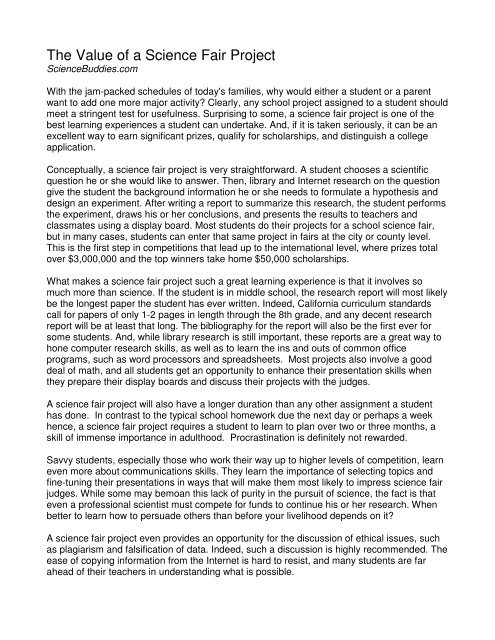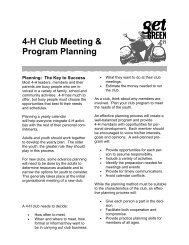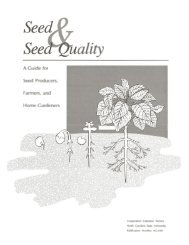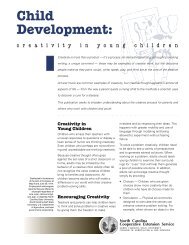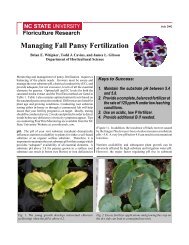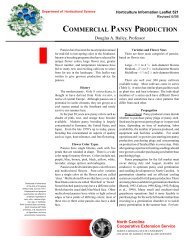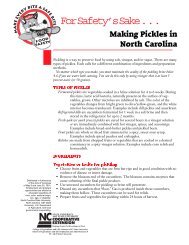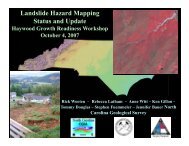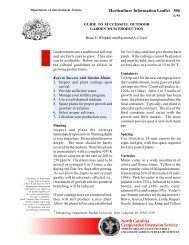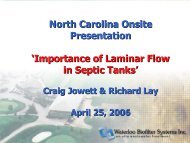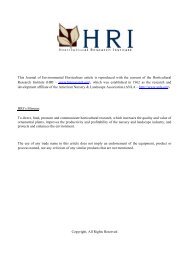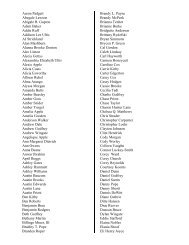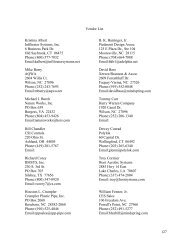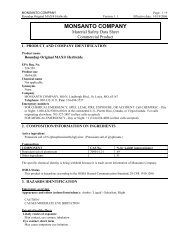The Value of a Science Fair Project - North Carolina State University
The Value of a Science Fair Project - North Carolina State University
The Value of a Science Fair Project - North Carolina State University
Create successful ePaper yourself
Turn your PDF publications into a flip-book with our unique Google optimized e-Paper software.
<strong>The</strong> <strong>Value</strong> <strong>of</strong> a <strong>Science</strong> <strong>Fair</strong> <strong>Project</strong><br />
<strong>Science</strong>Buddies.com<br />
With the jam-packed schedules <strong>of</strong> today's families, why would either a student or a parent<br />
want to add one more major activity? Clearly, any school project assigned to a student should<br />
meet a stringent test for usefulness. Surprising to some, a science fair project is one <strong>of</strong> the<br />
best learning experiences a student can undertake. And, if it is taken seriously, it can be an<br />
excellent way to earn significant prizes, qualify for scholarships, and distinguish a college<br />
application.<br />
Conceptually, a science fair project is very straightforward. A student chooses a scientific<br />
question he or she would like to answer. <strong>The</strong>n, library and Internet research on the question<br />
give the student the background information he or she needs to formulate a hypothesis and<br />
design an experiment. After writing a report to summarize this research, the student performs<br />
the experiment, draws his or her conclusions, and presents the results to teachers and<br />
classmates using a display board. Most students do their projects for a school science fair,<br />
but in many cases, students can enter that same project in fairs at the city or county level.<br />
This is the first step in competitions that lead up to the international level, where prizes total<br />
over $3,000,000 and the top winners take home $50,000 scholarships.<br />
What makes a science fair project such a great learning experience is that it involves so<br />
much more than science. If the student is in middle school, the research report will most likely<br />
be the longest paper the student has ever written. Indeed, California curriculum standards<br />
call for papers <strong>of</strong> only 1-2 pages in length through the 8th grade, and any decent research<br />
report will be at least that long. <strong>The</strong> bibliography for the report will also be the first ever for<br />
some students. And, while library research is still important, these reports are a great way to<br />
hone computer research skills, as well as to learn the ins and outs <strong>of</strong> common <strong>of</strong>fice<br />
programs, such as word processors and spreadsheets. Most projects also involve a good<br />
deal <strong>of</strong> math, and all students get an opportunity to enhance their presentation skills when<br />
they prepare their display boards and discuss their projects with the judges.<br />
A science fair project will also have a longer duration than any other assignment a student<br />
has done. In contrast to the typical school homework due the next day or perhaps a week<br />
hence, a science fair project requires a student to learn to plan over two or three months, a<br />
skill <strong>of</strong> immense importance in adulthood. Procrastination is definitely not rewarded.<br />
Savvy students, especially those who work their way up to higher levels <strong>of</strong> competition, learn<br />
even more about communications skills. <strong>The</strong>y learn the importance <strong>of</strong> selecting topics and<br />
fine-tuning their presentations in ways that will make them most likely to impress science fair<br />
judges. While some may bemoan this lack <strong>of</strong> purity in the pursuit <strong>of</strong> science, the fact is that<br />
even a pr<strong>of</strong>essional scientist must compete for funds to continue his or her research. When<br />
better to learn how to persuade others than before your livelihood depends on it?<br />
A science fair project even provides an opportunity for the discussion <strong>of</strong> ethical issues, such<br />
as plagiarism and falsification <strong>of</strong> data. Indeed, such a discussion is highly recommended. <strong>The</strong><br />
ease <strong>of</strong> copying information from the Internet is hard to resist, and many students are far<br />
ahead <strong>of</strong> their teachers in understanding what is possible.
Of course, learning about science is at the heart <strong>of</strong> a science fair project. Our society relies<br />
more on science every day, and science fairs are a great way for students to become more<br />
knowledgeable about how the world around them works. Every citizen needs sufficient<br />
science literacy to make educated decisions about what he or she reads in the media, about<br />
health care, and about other every-day problems.<br />
Preparing a science fair project is an excellent example <strong>of</strong> what education experts call active<br />
learning or inquiry (also "hands-on" learning). It is a very effective instructional method;<br />
indeed, it is recommended as a cornerstone <strong>of</strong> successful science teaching. Yet, according to<br />
the National Research Council, active learning is not employed <strong>of</strong>ten enough in the<br />
classroom and its absence is seen as one <strong>of</strong> the key factors behind kids losing interest in<br />
science and not performing to their potential.<br />
Colleges want to see what students have done with the opportunities they had available to<br />
them, and science competitions are a fantastic opportunity. Typically, 2–4 percent <strong>of</strong> science<br />
fair entrants at the high school level move on to the top level <strong>of</strong> science fair competition, the<br />
Intel International <strong>Science</strong> and Engineering <strong>Fair</strong> (ISEF). While the competition is stiff, those<br />
odds are a lot better than the lottery. And clearly the state <strong>of</strong> New York is on to something.<br />
Students from Long Island came home from the 2003 International <strong>Science</strong> and Engineering<br />
<strong>Fair</strong> with prizes and scholarships totaling $114,500.<br />
2008, <strong>North</strong> <strong>Carolina</strong> - <strong>State</strong> and National Level <strong>Science</strong> <strong>Fair</strong> Achievement Summary<br />
260 Youth Participating at <strong>North</strong> <strong>Carolina</strong> <strong>State</strong> <strong>Science</strong> and Engineering <strong>Fair</strong><br />
Grades 3 – 12, and equivalent aged youth<br />
$7,000 in awards presented<br />
College Scholarships were given by<br />
• Meredith College<br />
• <strong>North</strong> <strong>Carolina</strong> <strong>State</strong> <strong>University</strong><br />
• and Ohio Wesleyan <strong>University</strong><br />
17, 5 th – 8 th grade youth were nominated for<br />
• the Society for <strong>Science</strong> and the Public Middle School Program<br />
• and the Discovery Education Young Scientist Challenge<br />
<strong>North</strong> <strong>Carolina</strong> winners went on to the International Sustainable World Energy, Engineering,<br />
and Environmental <strong>Project</strong> Olympiad (I-SWEEP) – Houston Texas<br />
52 Countries, 38 <strong>State</strong>s<br />
Awards Earned:<br />
• one Gold<br />
• two Bronze<br />
• Special Award for Environmental Friendly Engineering Design<br />
<strong>North</strong> <strong>Carolina</strong> winners went on to the Intel International <strong>Science</strong> and Engineering <strong>Fair</strong> (ISEF)<br />
– Atlanta Georgia<br />
1550 High School aged youth<br />
51 Countries<br />
Awards Earned:
Overall:<br />
• 3 rd in Energy and Transportation<br />
• 1 st in Medicine and Health Services<br />
• 3 rd as a team award<br />
Special Awards:<br />
• 1 st - US Air Force<br />
• 2 nd - American Institute <strong>of</strong> Aeronautics and Astronautics<br />
• Full scholarship - Drexel <strong>University</strong><br />
• 2 nd - American Association for Clinical Chemistry<br />
• 1 st - Ashtavadhani Vidwan Ambati Subbaraya Chetty (AVASC) Foundation<br />
• 1 st - National Anti-Vivisection Society<br />
Prizes and scholarships totaling more than $115,200
<strong>Science</strong> <strong>Fair</strong> Tips for Success<br />
by Amber Hess<br />
Highlights<br />
• Choose An Exciting Topic<br />
o<br />
o<br />
o<br />
Choose a topic that will interest and challenge you.<br />
Do not be afraid to try something new—you will learn about it along the way.<br />
Remember that complicated-looking projects do not guarantee a win!<br />
• Learn Cool <strong>The</strong>ories<br />
o<br />
o<br />
o<br />
After picking a topic, spend a lot <strong>of</strong> time gathering background research.<br />
Look for important concepts and equations that will explain how and why your<br />
experimental results turn out the way they do.<br />
Find equations that will help you predict the outcome <strong>of</strong> your experiment.<br />
Learn all the important math, physics, chemistry etc. in order to fully<br />
understand your project.<br />
• Be a True Scientist<br />
o<br />
o<br />
o<br />
• Trudge Onward!<br />
o<br />
o<br />
o<br />
o<br />
Keep a detailed and up-to-date lab notebook with you regularly.<br />
It will help you organize your thoughts and if you ever need to go back to see<br />
how you did something, you can find out.<br />
Judges will want to see a lab notebook during the judging period.<br />
During the experiment, do not get discouraged if you run into a lot <strong>of</strong><br />
problems.<br />
Do not stop if your experiment does not turn out the way you think it should.<br />
It's okay if your hypothesis is proved incorrect.<br />
Judges like to see persistence, so keep at it! Ask for advice if you need help.<br />
Judges love to talk about the problems you ran into and how you solved/tried<br />
to solve them.<br />
• Use Your Brain (it's not as hard as it seems!)<br />
o<br />
o<br />
Look at your results and ask yourself why they do/do not make sense.<br />
Apply your background research to your results to help you figure out what<br />
happened during the experiment.
<strong>The</strong> Details<br />
Choose an Exciting Topic<br />
• Choose a topic that will interest and challenge you.<br />
o<br />
Easy topics like "How long does the flavor <strong>of</strong> bubble gum last?" will not<br />
impress the judges unless you study the molecular structure <strong>of</strong> each type <strong>of</strong><br />
gum by using NMR. (If you have no idea what I'm talking about, that is<br />
precisely my point. Look up what NMR is.) Besides, you will not learn any<br />
cool science doing an easy project.<br />
• Do not be afraid to try something new—you will learn about it along the way.<br />
o<br />
o<br />
A lot <strong>of</strong> top science fair participants explore new areas, and they do just fine<br />
in science competitions.<br />
You might find you enjoy an area you never would have picked otherwise!<br />
• Remember that complicated-looking projects do not guarantee a win.<br />
o<br />
Simple topics can actually turn into great projects. At most science fairs, a<br />
student with a simple project who "knows their stuff" will win over a student<br />
with a complicated project who is not as great a presenter (this is especially<br />
true at higher level fairs).<br />
• Do not choose a topic that is so open-ended that you will not make much progress.<br />
o<br />
o<br />
Focus on one aspect <strong>of</strong> a topic to narrow down what you will work on.<br />
Example: Let's say you want to create the world's first extremely intelligent<br />
robot. <strong>The</strong>re is no way you will be able to complete this project in a year!<br />
Instead, you might pick one small part <strong>of</strong> the programming to work on. You<br />
could then emphasize how your piece fits into the building <strong>of</strong> a robot.<br />
• Do not pick a broad topic unless you are an expert in that field or plan on learning a<br />
ton <strong>of</strong> information. Judges could pummel you with questions about aspects <strong>of</strong> the<br />
subject you are unfamiliar with.<br />
o<br />
Learn Cool <strong>The</strong>ories<br />
Example: Global warming is creating a huge discussion these days. If you<br />
want to study global warming, you should pick one potential cause <strong>of</strong> global<br />
warming to focus on, or one area that shows the extent <strong>of</strong> global warming.<br />
• After picking a topic, spend a lot <strong>of</strong> time gathering background research.<br />
• Your background research is one <strong>of</strong> the most important parts <strong>of</strong> your project. It is the<br />
basis for what you will be presenting to the judges. I cannot over-emphasize the<br />
importance <strong>of</strong> understanding the correct background information.<br />
• What is the purpose <strong>of</strong> background research?<br />
o<br />
It will help you formulate a hypothesis. <strong>The</strong> more you understand your topic,<br />
the better you can predict what might happen.
o<br />
o<br />
o<br />
It will help you create a well-designed procedure that will save you more time<br />
than one that is less thought out.<br />
It will let you foresee some <strong>of</strong> the inevitable problems that will come up.<br />
Analyzing your results will be easier and your conclusions will be more<br />
detailed.<br />
• Look for important concepts, definitions, and equations that will explain how and why<br />
your experimental results turn out the way they do. Also research why your topic is<br />
important in today's society.<br />
o<br />
o<br />
o<br />
Example: if you were studying the fermentation <strong>of</strong> yogurt, you would need to<br />
study what bacteria are, what structures make them up, and what chemical<br />
processes they use to create yogurt. You would also need to learn why<br />
yogurt fermentation is important/ useful. Always answer the question: "Who<br />
cares?"<br />
Example: if you were studying rockets, you would want to look up things like<br />
drag, how various models fly differently and why, physics equations to<br />
explain a rocket's behavior, etc. How rockets are used in the world is also<br />
important.<br />
Example: if you were studying whether oranges lose or gain vitamin C after<br />
being picked, you would want to study the plant structure <strong>of</strong> oranges<br />
(including the structure <strong>of</strong> their cells); what vitamin C is used for in the plant;<br />
how humans use vitamin C; the chemical properties <strong>of</strong> vitamin C (its<br />
molecular structure, solubility, etc.); and titration, iodine, or starch techniques<br />
to measure the amount <strong>of</strong> vitamin C in the orange.<br />
• Do not get discouraged if your research seems too difficult to understand. Start with<br />
the basics, and work upward. Sometimes you have to read an article a few times (or<br />
ten!) before you even begin to understand it. Push yourself to the limit <strong>of</strong> your<br />
understanding, and do not be afraid to tackle concepts you have never seen before<br />
(it is normal for much <strong>of</strong> your background research to look alien to you the first time<br />
you see it). One <strong>of</strong> the reasons people do a science project is to learn new<br />
information and challenge themselves.<br />
• Go in-depth with your research. Try learning advanced concepts and be as detailed as<br />
possible. <strong>The</strong> more you know, the more the judges will be impressed.<br />
o<br />
Example: For the previous yogurt fermentation example, you would not just<br />
look up the definitions <strong>of</strong> the chemical processes that cause fermentation and<br />
write a few lines about how sugar is used to create lactic acid. Go further into<br />
the information! Study glycolysis, and go through each step in the cycle. Look<br />
up things like ATP, phosphorylation, oxidation, reduction, DPG, PEP, etc.<br />
<strong>The</strong>se probably sound like complicated terms. But it's ok—you haven't<br />
learned them yet! Do not let something that sounds confusing halt your<br />
research. If you keep reading the information and ask questions, you will<br />
understand it eventually.
Be a True Scientist<br />
• Keep a detailed and up-to-date lab notebook with you at all times.<br />
o<br />
o<br />
o<br />
It will help you organize your thoughts and if you ever need to go back to see<br />
how you did something, you can.<br />
Judges will want to see a lab notebook during the judging period.<br />
Write even the smallest detail in your notebook, because if you think you will<br />
remember a piece <strong>of</strong> information, believe me, you won't (I know from<br />
experience).<br />
• Write up an organized plan. What do you think you will do each day during the<br />
experiment? What do you plan on doing?<br />
• Try to think <strong>of</strong> all the possible problems you might run into during the experiment and<br />
rewrite your procedure to account for them. This includes possible errors in<br />
measurement, contamination, timing issues, etc.<br />
• Do not cram your experiment into a short period <strong>of</strong> time unless your procedure calls for<br />
it.<br />
• Do as many trials as possible (at the very least, do three for a longer experiment). <strong>The</strong><br />
more trials, the more credible your data will be.<br />
Trudge Onward!<br />
• During the experiment, do not get discouraged if you run into a lot <strong>of</strong> problems.<br />
o<br />
o<br />
Do not stop if your experiment does not turn out the way you think it should.<br />
Running into problems is not an excuse to quit your project.<br />
It's okay if your hypothesis is proved incorrect. As long as you did an<br />
experiment, you will get credit.<br />
• Judges like to see persistence, so keep at it! Always ask "why?" And "how?" Solving<br />
problems and repairing accidents may take a while, and the answer will only come<br />
with perseverance. If you just stop working, you will not accomplish anything. Do<br />
more research, walk through your procedure, and try to solve problems. <strong>The</strong>se<br />
problems may lead to innovative solutions that you can describe during the judging<br />
interview. Try to fix the problems yourself first, but then ask a parent or advisor for<br />
advice if you are still stuck.<br />
o<br />
o<br />
Example: Every single one <strong>of</strong> my projects had problems during the<br />
experiment. Instead <strong>of</strong> being embarrassed about it, I did more research,<br />
analyzed my procedure to find out what I did wrong, and I asked my mentor<br />
for help. In fact, an accident during my 2003 project turned into my 2005<br />
project, which was the project that won the most prestigious awards!<br />
Example: A scientist was investigating ways to make radars more powerful<br />
when he discovered that some waves melted a chocolate bar in his pocket.<br />
This led to the development <strong>of</strong> the microwave oven. If you pursue your
o<br />
problems and accidents, you will end up with a great project. If you give up,<br />
you will not have anything.<br />
Judges love to talk about the problems you ran into and how you solved or<br />
tried to solve them. This shows them that you did not give up easily and that<br />
you pursued your problems. If you solved the problems, it also shows you<br />
were motivated to figure out a clever solution.<br />
Use Your Brain (it's not as hard as it seems!)<br />
• Examine your results and ask yourself why they do or do not make sense, and "what<br />
do my results mean?"<br />
o<br />
o<br />
o<br />
o<br />
Look at the concepts/equations you researched earlier and apply them to<br />
your results.<br />
Write in-depth explanations about your results and what you think happened<br />
during your experiment.<br />
Discuss all the applicable equations/concepts and show how accurate they<br />
were.<br />
Example: "Do Oranges Lose or Gain Vitamin C After Being Picked?" This is<br />
the same example as before. If your results showed that the amount <strong>of</strong><br />
vitamin C increased if the oranges were left on the tree longer, why did this<br />
happen? How do oranges store vitamin C? What would be the benefit <strong>of</strong><br />
storing more vitamin C?<br />
• If you do not understand something, keep trying to find the answer. Search the<br />
Internet, ask a teacher or mentor, look through books or articles, etc.


